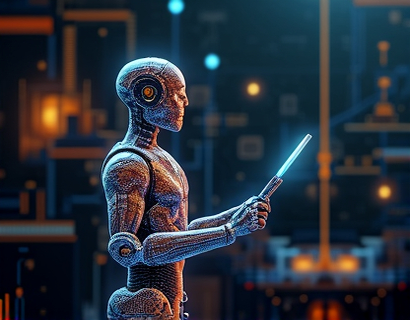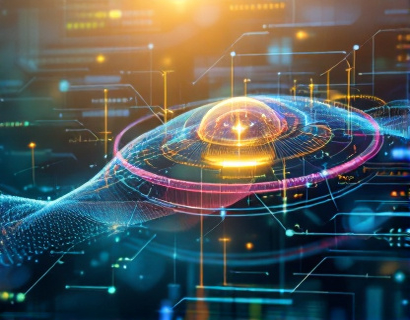Crypto and AI: Driving the Future of Digital App Ecosystems with Advanced Technology Solutions
The convergence of cryptocurrency and artificial intelligence (AI) is revolutionizing the digital landscape, creating a new era of app ecosystems that are more efficient, secure, and user-friendly. As technology continues to evolve, the integration of these two powerful forces is reshaping how we interact with digital applications, offering innovative solutions that enhance user experiences. This article delves into the transformative impact of cryptocurrency and AI on digital interactions, providing insights for tech enthusiasts and professionals eager to stay ahead in this rapidly changing environment.
The Rise of Cryptocurrency
Cryptocurrency has emerged as a groundbreaking financial technology, offering decentralized and secure transactions that challenge traditional banking systems. With the advent of Bitcoin in 2009, the concept of digital currency gained traction, leading to the development of thousands of alternative cryptocurrencies. These digital assets operate on blockchain technology, which ensures transparency, security, and immutability of transactions.
As cryptocurrencies gain mainstream acceptance, they are being integrated into various applications, from payment systems to decentralized finance (DeFi) platforms. This integration allows users to transact seamlessly without intermediaries, reducing costs and increasing efficiency. Moreover, the rise of non-fungible tokens (NFTs) has opened new avenues for digital ownership and creativity, further solidifying the role of cryptocurrency in the digital ecosystem.
The Role of Artificial Intelligence
Artificial intelligence, on the other hand, is transforming how we process and analyze data. AI technologies, including machine learning, natural language processing, and computer vision, enable applications to learn from user interactions and improve over time. This capability allows for personalized experiences, predictive analytics, and enhanced decision-making processes.
In the context of app ecosystems, AI can optimize user engagement by analyzing behavior patterns and preferences. For instance, AI-driven recommendation systems can suggest relevant content or products, increasing user satisfaction and retention. Additionally, AI can automate customer support through chatbots, providing instant assistance and improving overall service quality.
The Convergence of Crypto and AI
The intersection of cryptocurrency and AI is where the real magic happens. By combining the strengths of both technologies, developers can create applications that are not only secure and efficient but also intelligent and adaptive. This convergence is paving the way for innovative solutions that enhance user experiences across various sectors.
Enhanced Security and Fraud Prevention
One of the most significant advantages of integrating AI with cryptocurrency is the enhancement of security measures. AI algorithms can analyze transaction patterns in real-time, identifying anomalies that may indicate fraudulent activities. By leveraging machine learning, these systems can continuously improve their detection capabilities, making it increasingly difficult for malicious actors to exploit vulnerabilities.
Furthermore, blockchain technology itself provides a secure framework for transactions, ensuring that data is tamper-proof. When combined with AI, the result is a robust security system that protects users' assets and personal information, fostering trust in digital applications.
Improved User Experience
The integration of AI into cryptocurrency applications can significantly enhance user experience. AI-driven interfaces can adapt to individual user preferences, providing personalized content and recommendations. For example, a cryptocurrency wallet could use AI to analyze a user's transaction history and suggest optimal investment strategies based on their risk tolerance and financial goals.
Moreover, AI can streamline the onboarding process for new users, guiding them through complex procedures and ensuring they understand the functionalities of the application. This level of personalization and support can reduce barriers to entry, making cryptocurrency more accessible to a broader audience.
Decentralized Autonomous Organizations (DAOs)
Decentralized Autonomous Organizations (DAOs) represent another exciting development at the intersection of cryptocurrency and AI. DAOs are organizations that operate through smart contracts on a blockchain, allowing for decentralized decision-making and governance. AI can play a crucial role in optimizing the operations of DAOs by analyzing data and providing insights that inform collective decision-making.
For instance, AI algorithms can evaluate proposals submitted to a DAO, assessing their potential impact and feasibility. This capability can enhance the efficiency of governance processes, ensuring that decisions are made based on data-driven insights rather than subjective opinions.
Transforming Digital Interactions
The integration of cryptocurrency and AI is transforming digital interactions in several key ways. As these technologies continue to evolve, they are reshaping how users engage with applications and each other.
Seamless Transactions
One of the most significant benefits of cryptocurrency is the ability to conduct seamless transactions across borders. By integrating AI, applications can further streamline this process, automating currency conversions and optimizing transaction fees. This capability is particularly valuable in a globalized economy where users expect quick and cost-effective solutions.
AI can also enhance the user experience by providing real-time updates on transaction statuses, ensuring that users are informed throughout the process. This level of transparency fosters trust and encourages users to engage more actively with digital applications.
Smart Contracts and Automation
Smart contracts are self-executing contracts with the terms of the agreement directly written into code. The integration of AI can enhance the functionality of smart contracts by enabling them to adapt to changing conditions and user inputs. For example, an AI-powered smart contract could automatically adjust payment terms based on market fluctuations or user behavior.
This level of automation not only increases efficiency but also reduces the potential for disputes, as the terms of the contract are executed automatically without the need for intermediaries. As a result, users can engage in transactions with greater confidence, knowing that the terms will be honored without bias.
Challenges and Considerations
While the convergence of cryptocurrency and AI presents numerous opportunities, it also poses challenges that must be addressed. As these technologies continue to evolve, stakeholders must consider the following factors:
Regulatory Compliance
The regulatory landscape surrounding cryptocurrency is still developing, and the integration of AI adds another layer of complexity. Developers must ensure that their applications comply with existing regulations while also anticipating future changes. This requires a proactive approach to compliance, including regular audits and updates to ensure adherence to legal requirements.
Data Privacy and Security
As AI systems rely on vast amounts of data to function effectively, concerns about data privacy and security are paramount. Developers must implement robust security measures to protect user data and ensure that AI algorithms are transparent and accountable. This includes obtaining user consent for data collection and providing clear explanations of how data will be used.
Ethical Considerations
The use of AI in decision-making processes raises ethical questions that must be addressed. Developers must consider the potential biases inherent in AI algorithms and take steps to mitigate these biases. This includes ensuring diversity in training data and regularly evaluating AI systems for fairness and accuracy.
The Future of Digital App Ecosystems
As cryptocurrency and AI continue to evolve, their impact on digital app ecosystems will only grow. The integration of these technologies is set to redefine how users interact with applications, creating a more efficient, secure, and personalized experience.
Emerging Trends
Several emerging trends are shaping the future of digital app ecosystems:
- Increased Adoption of Decentralized Finance (DeFi): DeFi platforms are gaining popularity as users seek alternatives to traditional financial systems. The integration of AI can enhance the functionality of DeFi applications, providing users with personalized investment strategies and risk assessments.
- Growth of NFT Marketplaces: The rise of NFTs has created new opportunities for digital ownership and creativity. AI can play a crucial role in curating and recommending NFTs, enhancing user engagement in these marketplaces.
- Expansion of AI-Powered Analytics: As businesses seek to leverage data for decision-making, AI-powered analytics tools will become increasingly important. These tools can provide insights into user behavior, enabling developers to create more targeted and effective applications.
- Integration of Voice and Conversational Interfaces: The use of voice and conversational interfaces is on the rise, and AI can enhance these interactions by providing natural language processing capabilities. This will enable users to engage with applications in a more intuitive and seamless manner.
Conclusion
The convergence of cryptocurrency and AI is driving the future of digital app ecosystems, creating innovative solutions that enhance user experiences and streamline interactions. As these technologies continue to evolve, they will reshape how we engage with digital applications, offering new opportunities for efficiency, security, and personalization. For tech enthusiasts and professionals, staying informed about these developments is essential to navigating the ever-changing digital landscape. Embracing the potential of cryptocurrency and AI will be key to unlocking the future of technology and ensuring that users can access the latest advancements in the digital world.











































